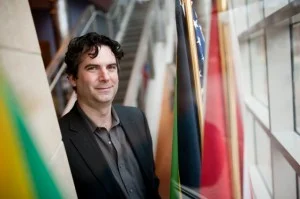
Mitchell A. Orenstein is Professor of Russian and East European Studies at University of Pennsylvania and Senior Fellow at Foreign Policy Research Institute. His sole-authored and co-authored works on the political economy and international affairs of Central and Eastern Europe have won numerous prizes.
His most recent book, Taking Stock of Shock (Oxford University Press, 2021), co-authored with Prof. Kristen Ghodsee, evaluates the social consequences of the 1989 revolutions that ended communism in Central and Eastern Europe and the former Soviet Union. It explores two theories: 1. After a short recession, everyone has done fine and achieved a new level of prosperity, and 2. 1989 unleased an economic catastrophe of enormous proportions that requires a strong hand to put right. Unexpectedly, Taking Stock of Shock finds strong support for both theories. While many people experienced a short dip followed by increased prosperity, a majority suffered an economic decline six times greater on average than the Great Depression. Meanwhile, Western international organizations tried to convince everyone that all was well, creating a bizarre political, economic, and social legacy of transition that remains to be overcome.
Orenstein is also the author of The Lands in Between: Russia vs. The West and the New Politics of Hybrid War (Oxford University Press, 2019), a study of how intensifying geopolitical conflict has shaped politics in the lands in between Russia and the West. It documents the “civilizational choice” faced by these countries, the resulting sharp polarization of politics, and the rise of corrupt power brokers who balance between both sides. While this politics is most evident in the lands in between, it is increasingly prevalent throughout Europe and the West. We are all lands in between.
Prior to this, Orenstein co-authored From Triumph to Crisis: Neoliberal Economic Reform in Postcommunist Countries (Cambridge University Press, 2018) with Prof. Hilary Appel. Based on newly available archives from the International Monetary Fund and World Bank, From Triumph to Crisis develops a new theory of the political economy of transition that explains the enduring triumph of neoliberalism in the region from 1989-2008, as capital-starved countries sought to signal their openness to investment with policy reforms. From Triumph to Crisis won the Laura Shannon Prize Silver Medal of the Nanovic Institute for European Studies in 2021.
“Ghodsee and Orenstein have written a provocative book. Drawing on an impressive array of economic, demographic, public opinion, and ethnographic data, they critically analyze the emergence of stark inequalities that have generated tremendous hardships for many and enormous benefits for some.”
— Gail Kligman, Distinguished Professor of Sociology, UCLA
“From a starting point of cacophony, where different disciplines and data seem to depict the post-Soviet transition as either a grand success or an absolute failure, Ghodsee and Orenstein seam together a convincing narrative where both achievements and disappointments can coexist. The book’s focus on widening inequality allows reconciling these opposing views and providing crucial insights not only for scholars of transition countries but also for observers and policymakers in other regions”
— Maurizio Bussolo, Lead Economist, World Bank
“A slender, astute study of Russia's nefarious modus operandi…clarifies many of the bewildering contradictions that directly affect European and American politics.” -- Kirkus Reviews
• Explains why Russia launched its hybrid war on the West and how Western institutions responded
• Offers original analysis of how hybrid war affects domestic politics in Central and Eastern Europe, Europe and North America
• Explores the paradox that in states divided by hybrid war, leading politicians often seek to profit from both sides
“Will be understandable to a wide range of readers, and not just to economists,” -- Economic Trends and Economic Policy (Croatia)
In the 1990s and the 2000s, influence flowed from West to East. . . . In the 2010s, influence flowed from East to West.
— Tim Snyder








